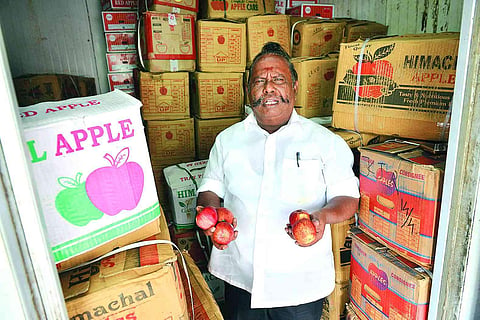

CHENNAI: When K Jayaraman’s customers, mostly small-time vendors, visit his wholesale shop in the Koyambedu market at 3 am, they would have already exchanged all the tens and twenties they had made the previous day to either Rs 500 or Rs 1,000 notes that could be carried in their ‘surukku pai’ (small drawstring pouch) easily at that odd hour.
“Things have changed since demonetisation. They now bring several currencies of smaller denominations that makes it more difficult for transactions in a wholesale shop like ours,” he said.
But, that is the least of Jayaraman’s worries. Ever since the high-value note ban, his shop has seen a 60 per cent drop in footfalls, said Jayaraman, while some customers had to be simply turned away due to the owner’s inability to issue change.
Consequently, their income has halved and their profits are close to nothing, said Jayaraman and his friend M Abdul Khader, who runs a vegetable shop in the market, agrees. “This month, I had to send four of my 10 labourers to Bihar where they come from, since I couldn’t afford them,” Jayaraman added.
Apart from that, wastage has been a constant source of worry, said shop owners. For instance, a vegetable shop owner claimed to have lost around 4,000 kg from a load of 25,000 kg during the last month.
“Before this, wastage was contained to around 1,500 to 2,000 kg,” he said.
As a result, shop owners in the market have increasingly turned to onions and tubers like potatoes and yam that have a slightly longer shelf life. Likewise, fruit vendors stock up apples that can be preserved in cold storage for around two months.
In Koyambedu, Asia’s largest perishable goods market, around 600 trucks arrive every morning - around 400 trucks of vegetables and 200 trucks of fruits. Flowers are usually carried in bags and baskets, brought to the market by the vendors themselves in share autos or buses.
While calling off the day’s load would seem like the best way forward considering the previous day’s load has not been sold, vendors like Jayaraman, who have been in business for over 45 years, have an ‘image’ to protect.
“If the trucks don’t arrive even for one morning, the neighbouring shops would take notice and the word will spread.
It’s not good for business.”
Produce arrives at the market from across the country - watermelons from Andhra Pradesh and Karnataka, apples from Himachal Pradesh and Kashmir, malta (blood oranges) from Ganganagar in Punjab, seedless grapes from Solapur and sapotas from closer home in Tirupattur.
The key, said wholesale dealers, was to retain the customers at all costs. “Some retailers have the option of closing their shop for a month and going to their hometowns for other work. We cannot do that,” said Jayaraman, adding that their business was based on reliability. “If we close our shops even for two days, they will find the next shop and move on,” he said.
So despite the wastage, they accept the next day’s load and find other ways to cut down expenditure.
Abdul Khader, for one, has canceled all family outings until business returns to normal.
In addition to their losses, shop owners said they were charged a maintenance fee of Rs 1 per square feet a month.
Hence, for an average shop owner with a 1,200 square feet shop, Rs 1,200 would have to be paid.
However, business has begun looking up in the market, say dealers. “The last few days, sales has gone up by around
10-20 per cent. So, we’re hopeful,” Jayaraman said.
On November 8, the price of tomatoes in the market was a mere Rs 4 per kg, according to the vendors, when usually a kg was priced at Rs 12.
“Last week, before Amma’s death, it was Rs 7 per kg,” said Abdul Khader.